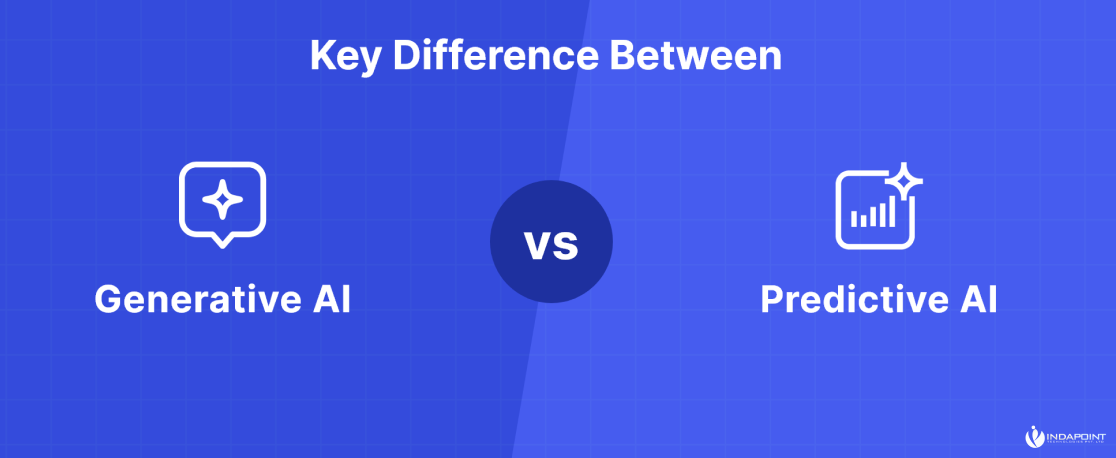Generative AI vs Predictive AI: Key Distinctions
June 7, 2024

Generative AI and Predictive AI serve distinct purposes: Generative AI creates new content like text and images using models such as GANs and Transformers, while Predictive AI forecasts future events based on historical data through models like regression analysis. Key differences include their technologies, applications, data dependency, evaluation metrics, and ethical considerations. Both offer transformative potential across various industries, enhancing creativity and predictive accuracy respectively.
Generative AI vs Predictive AI: Key Distinctions
Artificial Intelligence (AI) has revolutionized various industries, making processes more efficient, enhancing user experiences, and driving innovation. Among the myriad of AI applications, Generative AI and Predictive AI stand out as two of the most significant. Understanding the key distinctions between Generative AI and Predictive AI can help businesses leverage these technologies effectively. Here, we delve into seven crucial differences to help you understand their unique capabilities and applications.
Definition and Core Purpose
Generative AI
It is designed to create new content. It leverages complex algorithms and vast amounts of data to generate text, images, music, and more that are indistinguishable from human-made content. The core purpose of Generative AI is to simulate creativity and produce original outputs.
Predictive AI
On the other hand, it focuses on forecasting future events based on historical data. Its primary goal is to predict outcomes and trends by identifying patterns and correlations within datasets. Predictive AI is used extensively in areas like financial forecasting, customer behavior analysis, and risk management.
Underlying Technologies

The technologies that underpin Generative AI and Predictive AI differ significantly:
Generative AI
It typically utilizes techniques such as Generative Adversarial Networks (GANs), Variational Autoencoders (VAEs), and Transformer models. These technologies enable the creation of new, high-quality content that can mimic real-world data.
Predictive AI
It relies on machine learning models like regression analysis, decision trees, and neural networks. These models are trained on historical data to predict future outcomes. Time series analysis and supervised learning are crucial components in Predictive AI systems.
Applications and Use Cases
Generative AI and Predictive AI have distinct applications across various industries:
Generative AI
It is used in content creation, such as writing articles, generating art, and composing music. It is also employed in drug discovery, where it can generate new molecular structures, and in virtual environments for creating realistic simulations.
Predictive AI
It is vital in sectors like finance for stock market predictions, healthcare for diagnosing diseases, and marketing for predicting customer behavior. It helps organizations make informed decisions by providing insights into future trends and potential risks.
Data Dependency and Quality
Both Generative AI and Predictive AI are data-driven, but their dependency on data varies:
Generative AI
It requires vast amounts of high-quality data to train its models effectively. The quality and diversity of the training data directly influence the quality of the generated outputs.
Predictive AI
It also depends on large datasets, but its focus is on the accuracy and relevance of historical data. The quality of predictions hinges on the representativeness and integrity of the data used for training the models.
Evaluation and Metrics
The success of Generative AI and Predictive AI is measured differently:
Generative AI
It is evaluated based on the realism and creativity of its outputs. Metrics such as the Inception Score (IS), Frechet Inception Distance (FID), and human evaluation are used to assess the quality of generated content.
Predictive AI
It is judged by the accuracy and reliability of its predictions. Common metrics include Mean Absolute Error (MAE), Root Mean Squared Error (RMSE), and R-squared values. The performance of predictive models is crucial for their practical application.
Ethical Considerations

Both types of AI come with ethical challenges, though they differ in nature:
Generative AI
It raises concerns about the potential for generating fake or misleading content, which can be used maliciously. Issues related to intellectual property and the authenticity of AI-generated works are also prevalent.
Predictive AI
It faces ethical dilemmas related to data privacy and bias. Predictive models can perpetuate existing biases present in historical data, leading to unfair or discriminatory outcomes. Ensuring ethical use of data and maintaining transparency in predictions are critical.
Future Prospects
The future of Generative AI and Predictive AI looks promising, with continuous advancements in technology and new applications emerging:
Generative AI
It is expected to revolutionize creative industries, enhance virtual and augmented reality experiences, and contribute to scientific research by generating new hypotheses and solutions. Innovations in natural language processing and computer vision will further expand its capabilities.
Predictive AI
It will continue to transform industries by providing deeper insights and more accurate forecasts. The integration of AI with Internet of Things (IoT) devices and real-time data analytics will enhance predictive accuracy and enable proactive decision-making.
Conclusion
Understanding the distinctions between Generative AI and Predictive AI is essential for businesses looking to harness the power of these technologies. While Generative AI excels in creating new and innovative content, Predictive AI is unparalleled in forecasting future trends and behaviors. Both have unique applications and are vital in different contexts.
If you’re considering incorporating AI into your operations, whether for content creation or predictive analytics, our team of experts is here to help. Contact us today to explore how we can assist you in leveraging Generative AI and Predictive AI to drive your business forward.





